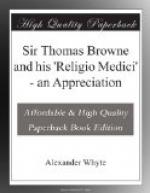Beware of philosophy, is a precept not to be received in too large a sense; for in this mass of nature there is a set of things that carry in their front, though not in capital letters, yet in stenography, and short characters, something of divinity, which to wiser reasons serve as luminaries in the abyss of knowledge, and to judicious beliefs, as scales and rundles to mount the pinnacles and highest pieces of divinity. The severe schools shall never laugh me out of the philosophy of Hermes, that this visible world is but a picture of the invisible, wherein, as in a portrait, things are not truly, but in equivocal shapes, and as they counterfeit some real substance in that invisible fabric.
ON FINAL CAUSE
There is but one first cause, and four second causes of all things; some are without efficient, as God; others without matter, as angels; some without form, as the first matter: but every essence, created or uncreated, hath its final cause, and some positive end both of its essence and operation; this is the cause I grope after in the works of nature; on this hangs the providence of God. To raise so beauteous a structure, as the world and the creatures thereof, was but His art; but their sundry and divided operations, with their predestinated ends, are from the treasure of His wisdom. In the causes, nature, and affections of the eclipses of the sun and moon, there is most excellent speculation; but to profound farther, and to contemplate a reason why His providence hath so disposed and ordered their motions in that vast circle, as to conjoin and obscure each other, is a sweeter piece of reason, and a diviner point of philosophy; therefore sometimes, and in some things, there appears to me as much divinity in Galen’s books De Usu Partium, as in Suarez’s Metaphysics: had Aristotle been as curious in the inquiry of this cause as he was of the other, he had not left behind him an imperfect piece of philosophy, but an absolute tract of divinity.
ON DEATH
This is that dismal conquest we all deplore, that makes us so often cry, O Adam, quid fecisti? I thank God I have not those straight ligaments or narrow obligations to the world as to dote on life, or be convulsed and tremble at the name of death. Not that I am insensible of the dread and horror thereof, or by raking into the bowels of the deceased, continual sight of anatomies, skeletons, or cadaverous relics, like vespilloes, or grave-makers, I am become stupid, or have forgot the apprehension of mortality; but that marshalling all the horrors, and contemplating the extremities thereof, I find not anything therein able to daunt the courage of a man, much less a well-resolved Christian. And therefore am not angry at the error of our first parents, or unwilling to bear a part of this common fate, and like the best of them to die, that is, to cease to breathe, to take a farewell




